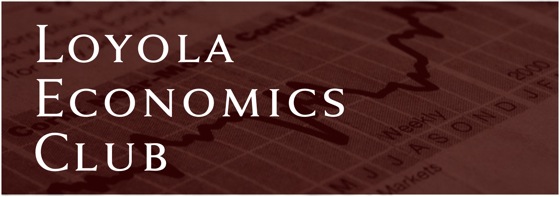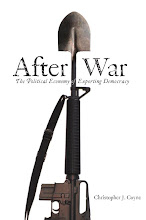Collective bargaining may be a right, but that does not necessarily imply that unionization is the right thing in every case. A normative support for unions must first begin with a full accounting of both benefits and costs.In the case at hand, high levels of unemployment might tip Sodexo's decision to decline a union contract today or decline a renewed union contract in the future - thus collective bargaining could jeopardize the long run job security of Loyola dining employees.Lastly, students should recognize that trade offs must be made. Higher costs of production may lead to a lower quality of service.
Sunday, February 28, 2010
Dr. D'Amico on Collective Bargaining and Unions
Saturday, February 27, 2010
NEW: Loyola Economics Club Newsletter
Capital and Labor: The Legos Of Our Economy

The prosperity of a country is tied to the effective usage of its available resources, i.e. capital and labor. The amount of capital and labor in any society is limited, therefore efficient resource allocation is essential for economic growth.
Capital and labor are not homogeneous resources. Certain types of capital work best with a certain types of labor, and vice versa. We cannot force capital or labor to efficiently work in conjunction with any arbitrary resource.
Unfortunately, what the government has done through the stimulus package is to stimulate growth and production by forcing capital and labor to collaborate without taking into consideration their specific purposes and characteristics.
In a Nightly Business Report blog post Steven Horwitz explains this concept:
To see this, I borrow an analogy from the economist Peter Boettke. Stimulus proponents seem to view resources as if they were Play-Doh that could be shaped into any form desired. […] If capital and labor were like Play-Doh, then it wouldn’t matter what government spent on as the idle capital and labor would be equally productive in whatever use was demanded. Unfortunately, capital and labor are more like Legos than Play-Doh. What kids can build with Legos depends on the particular shapes and sizes of the pieces they have and whether and how those pieces can fit together. Any two hunks of Play-Doh can be combined to make a desired object. That is not true for Legos, and it’s not true for capital and labor.
Horwitz concludes that the current pattern of resource allocation should be reevaluated.
Government should not determine the economy’s resource allocation. This task should be left to markets and economic actors. Free markets may appear chaotic, but they do a better job than a centralized bureaucracy of distributing knowledge and allocating resources through competitive prices.
Thursday, February 25, 2010
ESSAY CONTEST
Wednesday, February 24, 2010
Walmart and Whole Foods: same taste at a different price
A recent blind tasting reveals Walmart to be both price competitive and “taste competitive” in the organic and locally grown foods industry.
A chef in Austin prepared two equal meals using two sets of the same ingredients. One set of ingredients came from Walmart, the other set came from Whole Foods. Even though the ingredients were the same, the total price differed greatly: Walmart charged $126.02, Whole Foods $176.04. After the chef cooked the foods the same way and arranged them side by side on a plate, a group of local food experts tried the two versions. The verdict? Same taste!
So, why is there such a difference in price if the ingredients and their tastes are practically the same?
Steven Horwitz argues that
“It is Walmart's very size, so hated by so many progressives and conservatives, that has enabled it to be such a powerful player in the local/slow/organic food markets.”
In other words, Walmart’s average cost per unit is lower due to its size and production level.
Economy of scale seems to be the straightforward explanation. Do you think there is more behind Whole Foods’ higher prices?
Thursday, February 18, 2010
Christopher Coyne on The Political Economy of Exporting Democracy

On Thursday the Econ Club had the pleasure of hosting Dr. Christopher Coyne, assistant professor of economics at WVU and author of "After War: The Political Economy of Exporting Democracy."
By using the tools of economics, Coyne analyzed the ability of the US to export democracy abroad. He took into consideration the American intervention in Iraq and Afghanistan and argued that the US failed to establish democracy due to too much reliance on the bureaucratic agencies and the public sector. Coyne concluded that a recovering country needs free trade and movement of people in order to effectively establish liberal and constitutional democracy.
Crucial to Coyne's argument is the distinction between democracy and liberal democracy. As explained in "After War":
Democracy deals with the method of selecting government officials, while liberal democracy deals with the goals of government: the protection of individual rights, the rule of law, and so on. (p. 11)Coyne's argument clearly challenges the current US political economy. Highlighting the role of incentives and free market, he identifies free trade of goods and people as being key elements to successfully encourage the establishment of liberal democracy abroad.
To what extent do you think a country can intervene beyond its borders in order to establish democracy? Do you think a developed country has the sufficient knowledge to impose political and economic systems abroad? Or do you think that non-intervention and free market could lead to global peace?


